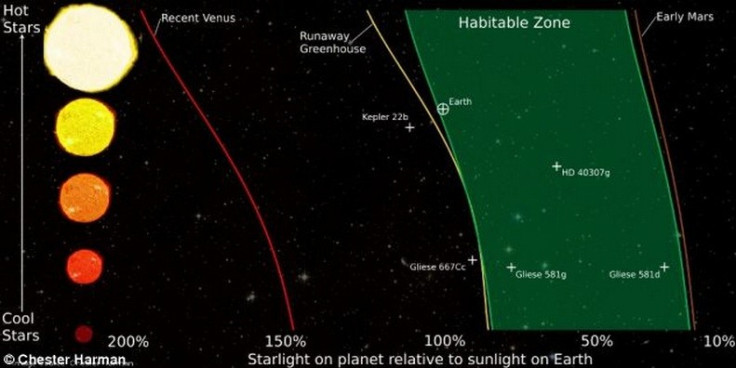Alien Life Graph Puts Earth on Edge of Space's Habitable Zone
Penn State Department of Geosciences scientists redraw band crucial for life to thrive

Planet Earth is on the edge of habitable space, according to research by astronomers.
Earth lies in the "Habitable Zone", a vast area regarded by scientists as being at the optimum distance from the sun - not so hot that water evaporates completely and not so cold that it freezes solid.
Researchers have built the most accurate image of the so-called "Goldilocks Zone" in 20 years to indicate which part of space has the greatest chance of sustaining life.
Their work revealed an amazing detail much closer to home: that Earth lies right on the cusp of the Goldilocks Zone and is very near, in cosmic terms, to a part of space where life would be impossible. Just a little closer to the Sun and life on earth would be wiped out.
Under previous calculations, the Earth lay in the middle of the Habitable Zone. Under the new model, it now lies a mere seven million kilometres from the edge.
The Penn State Department of Geosciences redrew the boundaries of the zone and discovered that life can exist farther away from the sun than previously believed. Researchers factored in recent data about how water and carbon dioxide absorb water from the sun.
The new picture is bad news for one planet long viewed by scientists as the most likely to host life, outside our solar system. Kepler-22b now lies outside the Goldlilocks Zone.
Nasa's Kepler space mission, designed to find possible life-bearing planets, has revealed 2,000 planetary bodies that have the potential to sustain life.
Roy Barnes of the University of Washington in Seattle said of the new model: "This is going to be the new gold standard for the Habitable Zone. We should always look at planets in the zone and say, maybe. It's not that planets in the zone are inhabited, it just means we can't rule them out yet."
Science fiction author Arthur C Clarke summed up humanity's search for life on other planets, saying: "Either we are alone in the universe or we are not. Either one is quite staggering."
© Copyright IBTimes 2025. All rights reserved.






















